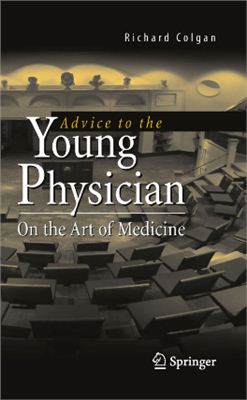Springer Science+Business Media, 2009, ISBN-10: 1441910336, 145
pages
Advice to the Young Physician introduces the origins of important teachings that form the basis of medicine as it has been taught by some of history's greatest educators in medicine. Advice to the Young Physician reveals how to make the transition from technician to healer.
This book reinforces the humanistic side of patient care, which is often overshadowed by the focus on highly technological elements. Medical students, residents, fellows, physicians, and allied health practitioners often forget the intricacies of the genomic makeup of adenoviruses, yet they remember the tips, anecdotes and aphorisms related by mentors, educators, and experienced physicians. The art of medicine comes from insights gained from unique and dynamic experiences between the physician, an enthusiastic medical student and the human patient, and is rarely found in books or taught in a universal and systematic way.
Advice to the Young Physician provides numerous examples of best practices in order to intealize and practice the art of medicine, including tenets taught by Hippocrates, Maimonides, Osler, Peabody, Schweitzer and others.
Advice to the Young Physician targets aspiring and new physicians with the intent to make them better physicians. It hits the mark. An effective mix of the writings of some of medicine's giants, as well as clinical experiences of the author, the book offers an historical framework and personal context to understand the attributes and attitudes of the good physician. It is a quick read that rewards the reader with a sampling of 4000 years of medical wisdom sprinkled with practical advice for the mode day doctor.
Advice to the Young Physician introduces the origins of important teachings that form the basis of medicine as it has been taught by some of history's greatest educators in medicine. Advice to the Young Physician reveals how to make the transition from technician to healer.
This book reinforces the humanistic side of patient care, which is often overshadowed by the focus on highly technological elements. Medical students, residents, fellows, physicians, and allied health practitioners often forget the intricacies of the genomic makeup of adenoviruses, yet they remember the tips, anecdotes and aphorisms related by mentors, educators, and experienced physicians. The art of medicine comes from insights gained from unique and dynamic experiences between the physician, an enthusiastic medical student and the human patient, and is rarely found in books or taught in a universal and systematic way.
Advice to the Young Physician provides numerous examples of best practices in order to intealize and practice the art of medicine, including tenets taught by Hippocrates, Maimonides, Osler, Peabody, Schweitzer and others.
Advice to the Young Physician targets aspiring and new physicians with the intent to make them better physicians. It hits the mark. An effective mix of the writings of some of medicine's giants, as well as clinical experiences of the author, the book offers an historical framework and personal context to understand the attributes and attitudes of the good physician. It is a quick read that rewards the reader with a sampling of 4000 years of medical wisdom sprinkled with practical advice for the mode day doctor.

